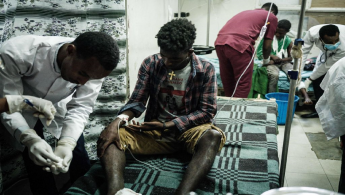WHO supplies reach Tigray but fuel shortage stops delivery
The WHO has delivered medical supplies to Ethiopia's troubled Tigray region for the first time since July -- but cannot get the fuel needed to distribute the aid, it said Tuesday.
The World Health Organization said an airlift of the supplies had begun on Friday to the regional capital Mekele, where they are now being held in storage.
The supplies include antibiotics, medicines for malaria and diabetes, treatment for severe acute malnutrition, supplies for reproductive health, plus personal protective equipment.
The shipments were via the WHO's sister UN agency the World Food Programme (WFP), with further flights planned this week.
However, the WHO cannot get the medicines and equipment to where they are needed across the northern region.
"There is a fuel problem to use and transport these supplies to health centres and hospitals," WHO spokesman Tarik Jasarevic told reporters in Geneva.
Tigray has for months been subject to what the United Nations says is a de-facto blockade, and the United States has accused the Ethiopian government of blocking aid, which in turn has blamed the rebels for the obstructions.
The UN's humanitarian agency OCHA said last week that fuel for humanitarian operations had not been allowed into Tigray since August, apart from two WFP trucks that got through in November.
"WHO calls again for unfettered access to provide humanitarian aid in Tigray," the UN health agency said in a statement.
"We call for fuel to be allowed into Tigray urgently, with the support from national authorities and international partners, so that WHO and partners can meet the humanitarian needs of all Ethiopians."
The east African country's parliament on Tuesday lifted a state of emergency imposed last November when Tigrayan rebels threatened to advance on the national capital Addis Ababa, the foreign ministry said, easing restrictions earlier than expected.
Fighting broke out in Tigray in November 2020 after Prime Minister Abiy Ahmed sent troops to topple the Tigray People's Liberation Front, the region's former ruling party, saying the move came in response to rebel attacks on army camps.
The WHO said its first shipments were part of 33.5 metric tonnes of planned deliveries which only represented a small portion of what was needed.
"Without access to supplies, health workers are trying to continue to provide health services with almost no medicines or functioning equipment," the organisation said.





 Follow the Middle East's top stories in English at The New Arab on Google News
Follow the Middle East's top stories in English at The New Arab on Google News


